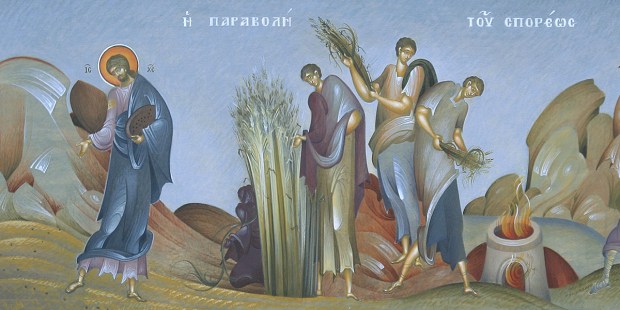 16th Sunday of the Year A
16th Sunday of the Year A
Readings: Wisdom 12:13,16‑19 Romans 8:26‑27 Matthew 13:24‑43
"Lord, you are good and forgiving." The refrain from this Sunday's responsorial psalm (Ps 86) captures the theme of today's readings. As we listen to the proclamation of the Lord's mercy, let us hear it as both an invitation to repentance and a call to show mercy ourselves.
The first reading from Wisdom is a hymn praising and thanking God for his mercy. Although God is mighty and just, the author of Wisdom is especially overwhelmed by God's clemency. “But though you are master of might,/ you judge with clemency,/ and with much lenience you govern us;/ for power, whenever you will attends you.” The lessons of God's mercy are twofold: (1) God's people must mingle justice with kindness and (2) always have hope for repentance. “And you taught your people, by these deeds,/ that those who are just must be kind;/ and you gave your sons good ground for hope/ that you would permit repentance for their sins.”
The second reading continues chapter 8 of Paul's letter to the Romans with an explanation of how the Spirit helps Christians pray while groaning inwardly in "weakness" as they await the completion of God's kingdom begun in Jesus. Paul understands the Christian community as the first fruits of the harvest of God's kingdom. Through Jesus' triumphant death and resurrection, we Christians have been given the gift of God's renewing Spirit which "makes intercession for us with groanings which cannot be expressed in speech." Although we may not even know how to articulate the deepest needs of our hearts, "He who searches hearts knows what the Spirit means, for the Spirit intercedes for the saints as God himself wills."
The Gospel reading continues Matthew's great parable chapter from last Sunday's readings with three more parables: the weeds and the wheat, the mustard seed, and the yeast. In order to understand the significance of these parables, it is helpful to recall what has preceded this chapter in Matthew. In chapters 11‑12 Jesus has clearly presented himself to the crowds and leaders as the Messiah, the very Wisdom of God, and has invited them to respond. Sadly, they have rejected Jesus' claims and have accused him of being possessed by Beelzebul. Now Jesus speaks to his opponents in "parables" which "announce what has lain hidden since the creation of the world," but they do not understand them because their minds and hearts are closed to Jesus' message.
Despite this depressing and potentially violent situation, Jesus' parables are filled with hope. Both the mustard seed and the yeast parables contrast the small, even insignificant, beginnings of "the reign of God" with its triumphant growth and outcome. The mustard seed “is the smallest seed of all, yet when full‑grown it is the largest of plants.” The image of the birds of the sky building their nests in its branches connotes a traditional image of the triumph of God's kingdom (see Ezek 17:23; 31:6; Dan 4:7‑9,17‑19). Likewise a little yeast is infinitesimally small in comparison with “three measures of flour,” yet when a woman kneads it into the dough, “the whole mass of dough began to rise.”
Although the weeds and wheat parable also ends with the hopeful image of a harvest in which the wheat is gathered into the barn, it makes another point for those who would like to immediately eliminate all opposition to the kingdom. This attitude is perfectly expressed in the speech of the owner's slaves who ask their master, “Do you what us to go out and pull them (the weeds) up?” The patience of the master in the parable is the same as that of Jesus in his ministry. Rather than responding violently to those who have rejected him, Jesus exercises patience in the hope that they may change. He also extends this lesson to his disciples who might be tempted to hasten the reign of God by sorting out the good and the bad. The master answers his slaves: "No, pull up the weeds and you might take the wheat along with them. Let them grow together until harvest; then at harvest time I will order the harvesters, first collect the weeds and bundle them up to burn then gather the wheat into my barn." In Jesus' allegorical interpretation of the parable we learn that the judgment will take place at the end of time and it will be the work of the Son of Man and his angels. This frees us, Jesus' followers, from the task of sorting out who are the saints and who are the evil ones. That will be the Son of Man's job at the end; we are free to be about the more productive work of extending the kingdom by proclaiming God's mercy and inviting people to repentance.
No comments:
Post a Comment